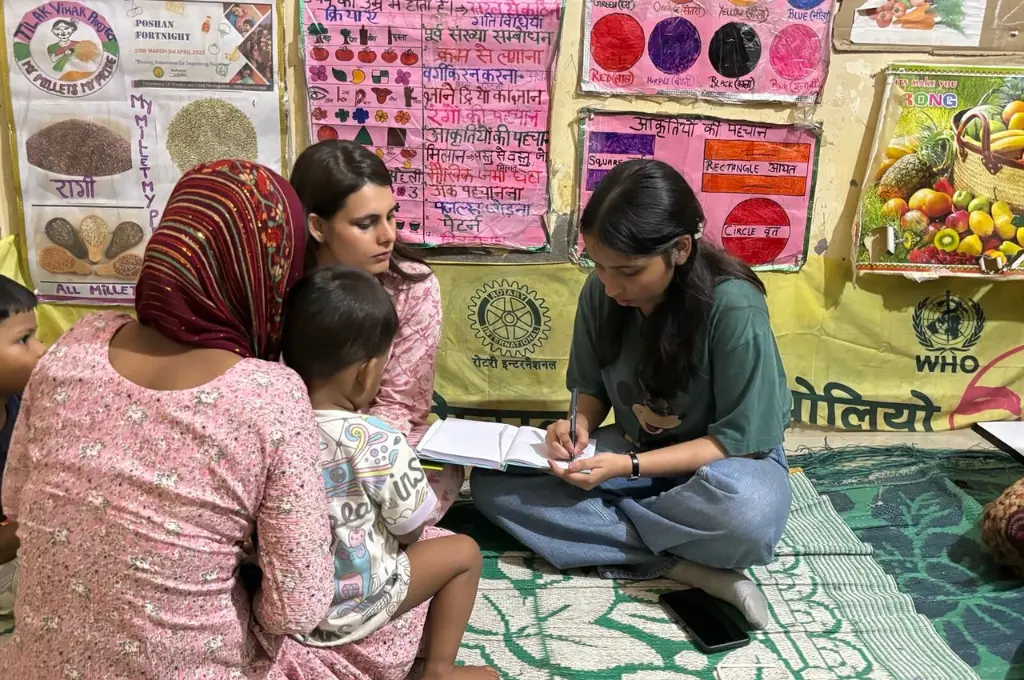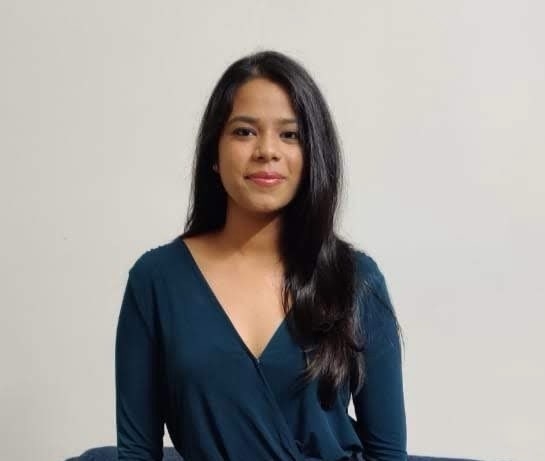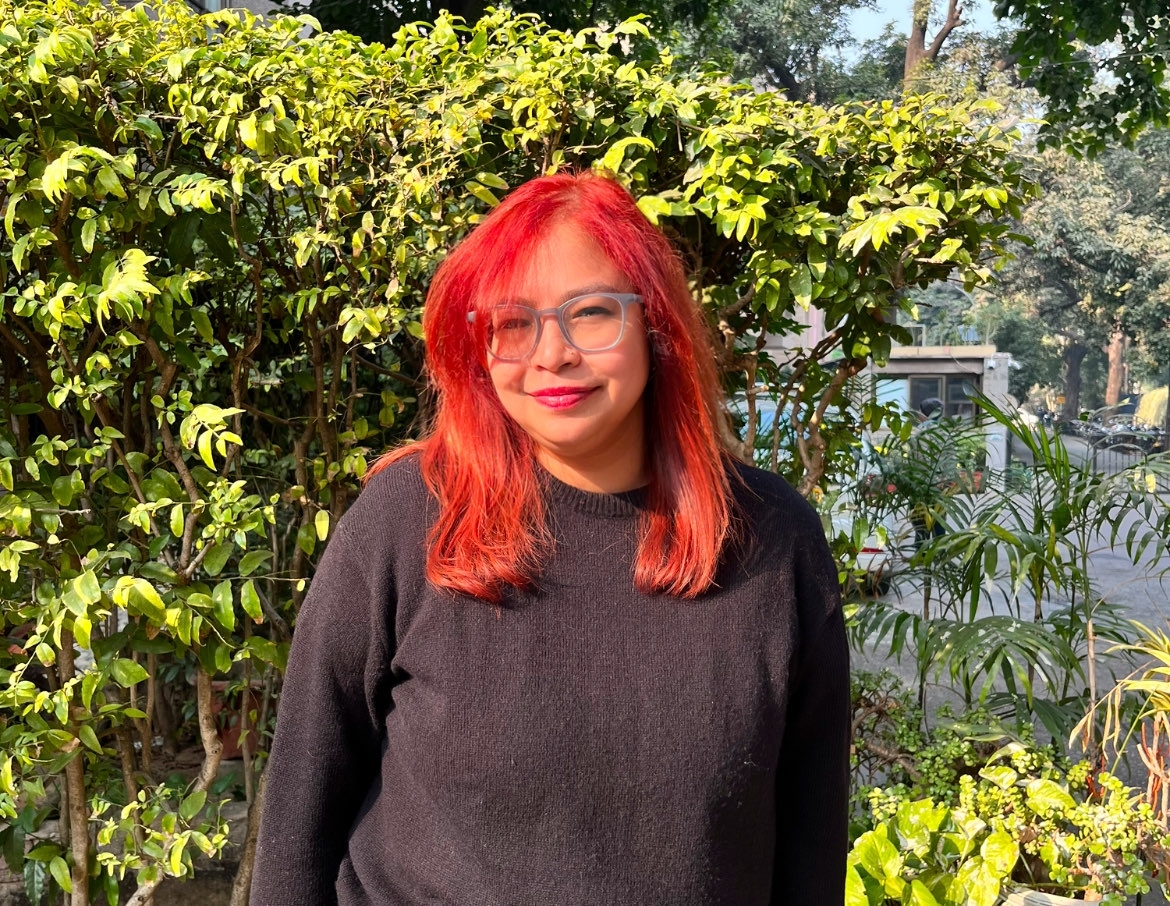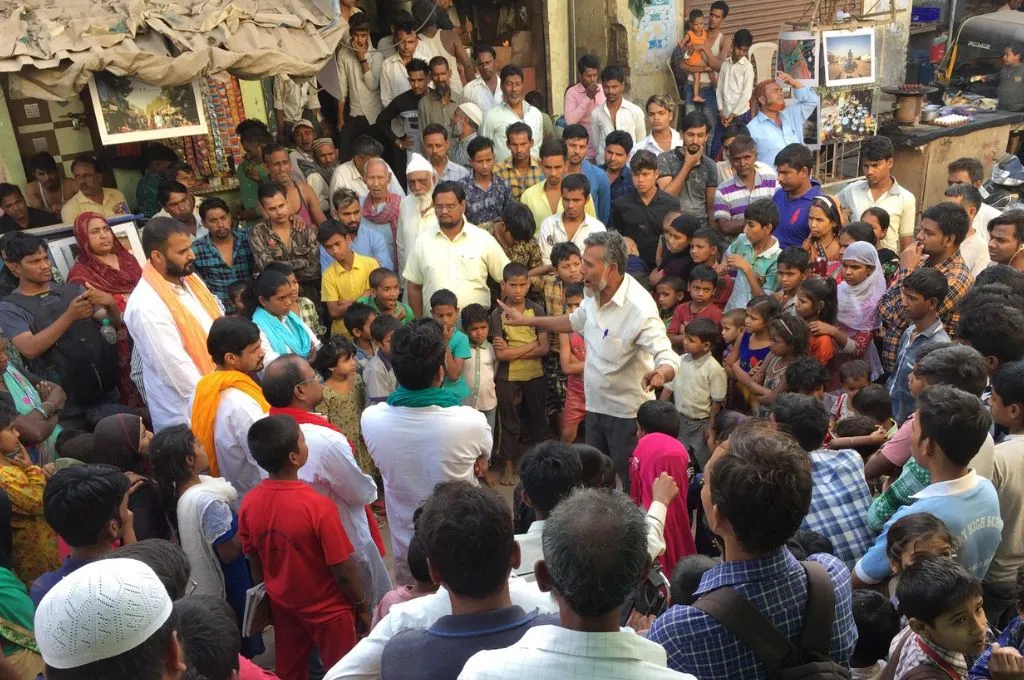Meena*, a 42-year-old domestic worker from Delhi, had faced more than 20 years of violence from her husband. In her locality, Poonam*, a community paralegal volunteer (PLV), was conducting legal awareness sessions for local women. Meena attended one such session and, for the first time, recognised her experience as domestic violence.
After the session, she approached Poonam, who explained her legal rights and the support systems available. Reassured, Meena saved Poonam’s number in case she needed help. A few days later, Meena called in distress. Poonam rushed to the hospital with her, helped document the injuries, and supported her in filing a police complaint. She then connected Meena with the District Legal Services Authority (DLSA), where a pro bono lawyer was assigned to her case.
Who are paralegal volunteers?
PLVs are community-based legal aid workers who provide essential legal services and support to marginalised communities. Operating under the National Legal Services Authority (Lok Adalat) Regulations, 2009—also known as the NALSA Scheme—these grassroots service providers act as a vital bridge, connecting vulnerable populations with legal institutions such as police stations, courts, and other government offices so that they can access government schemes. PLVs are selected through interviews conducted by the DLSA. Selection criteria vary across DLSAs, with some focusing on community members or law students, and others opting for a mix of both. PLVs typically undergo a one- to three-day induction training, followed by occasional refresher courses, to equip them with basic legal knowledge and the skills needed to assist their communities. The payment for the days they are engaged is decided by the State Legal Services Authority. In Delhi, for instance, PLVs receive an honorarium of INR 1,000 for a full day’s work.

PLVs are crucial intermediaries between communities and the justice system. The Indian legal system’s complexity and prohibitive costs create obstacles to justice for vulnerable populations. The challenges include the high cost of legal aid, lack of awareness about legal rights, and people’s inability to navigate the intimidating legal system. Many marginalised individuals also face discrimination, social stigma, and language barriers that further impede their access to justice. PLVs work at the grassroots level and provide legal aid, information, and assistance with representation to disadvantaged communities, particularly in rural and remote areas where access to formal legal services is limited. From raising legal awareness to supporting individual cases in court and accompanying community members to government hospitals and offices to access entitlements, PLVs offer end-to-end support throughout a survivor’s journey to safety.
The PLV scheme was initiated for community workers to formally engage with Legal Service Institutions (LSIs), which are state-funded bodies that provide free legal services to eligible individuals. However, owing to PLVs’ effectiveness in ensuring last-mile service delivery, the initiative has expanded, with nonprofits also training and deploying PLVs to work on specialised areas of intervention. These partnerships have broadened the reach of the PLVs, creating a comprehensive support network at the community level.
The legal status of LSIs and PLVs
A recent landmark ruling by the Delhi High Court, SV vs State, crystallised the extensive mandate of LSIs in supporting survivors, particularly those of sexual crimes and acid attacks.
While reaffirming survivors’ right to free medical care, the ruling outlines a comprehensive framework that goes beyond immediate healthcare intervention. It calls for sustained legal assistance, ongoing protection, streamlined compensation processes, and necessary rehabilitation support. By recognising the need for holistically grounded long-term recovery, the judgment shifts the emphasis from incident-specific responses to continuous support. In this context, PLVs are instrumental in translating the court’s mandate into tangible assistance for survivors by helping them access these support mechanisms.
Field research by the Migration and Asylum Project (MAP) reveals the transformative impact of PLVs.
Transformative agents in India’s social support system
PLVs serve as trusted community anchors who establish safe spaces that enable survivors of sexual abuse and violence to speak up. Their effectiveness is particularly evident in cases where meaningful intervention requires more than legal representation. When confronted with systemic resistance, such as police reluctance to register complaints or procedural hurdles, the presence of PLVs has proven crucial in ensuring proper case documentation and the protection of survivor rights.
While their role is most vital in the initial stages, such as filing complaints and securing legal representation, PLVs continue to offer support throughout the life cycle of a case, even when their role shifts towards providing consistent updates, support, and guidance.
The scope of PLV intervention is not limited to legal advocacy alone; it also encompasses comprehensive survivor support. Their presence proves critical in facilitating medical examinations, coordinating with senior law enforcement officials for First Information Report (FIR) registration, and ensuring access to protective services such as shelter homes. Furthermore, PLVs serve as vital links to social welfare, connecting survivors and their dependants to essential government schemes and nutritional support programmes in the immediate aftermath. Most importantly, PLVs function as continuous psychosocial support pillars throughout a survivor’s rehabilitation journey, from navigating court proceedings to enabling economic reintegration.
During our research, PLVs stated that consistent engagement, particularly in remote communities, results in enhanced legal awareness and leads to increased reporting of incidents. Their community impact is comparable to that of established grassroots health workers such as ASHAs and Anganwadi workers, underscoring their key position in India’s social support infrastructure.
The intersection of gender and legal support
Among the factors determining the impact of PLVs, gender representation emerges as particularly significant. Women PLVs have been especially successful in addressing cases of sexual and gender-based violence, primarily due to their ability to establish trust with survivors. This trust is rooted in shared lived experiences and deep cultural understanding, enabling more effective case reporting and survivor support.
Survivors face multiple, intersecting forms of marginalisation. Experiences shaped by caste, religion, disability, or sexual orientation can exacerbate the barriers to accessing justice. Women from Scheduled Castes, Scheduled Tribes, and the transgender community encounter deep-seated prejudice and systemic obstacles when engaging with the police or navigating the legal system—especially when the perpetrator holds caste, class, or institutional privilege. Their pursuit of justice is rarely limited to addressing the crime alone; it also entails confronting stigma, discrimination, and institutional neglect at every step.
One such case was that of a transgender woman in Delhi, a survivor of rape, who attempted to report the crime. Instead of receiving protection, she was subjected to further sexual assault and harassment by the very authorities responsible for upholding justice. Determined to help others in similar circumstances, she trained to become a PLV. Today, registered with one of the DLSAs in Delhi, she works to ensure that other transgender survivors do not face the same obstacles she once did in the legal system.
The 2022 India Justice Report notes that the national female PLV representation increased from 35 percent to 40 percent between March 2020 and June 2022. However, disaggregated district-level data reveals significant disparities, with several districts falling well below the national average. This underscores the urgent need for targeted interventions to achieve gender parity in paralegal services across all regions.
Challenges to the PLV system
Despite promising outcomes, critical challenges impede the PLV scheme’s effectiveness. The India Justice Report reveals a concerning 15 percent decline in PLV numbers nationally—from 53,679 in 2020 to 45,636 in 2022. A Parliamentary Standing Committee’s 2024 report on the working of legal aid emphasises the chronic underutilisation of PLVs due to the lack of proper monitoring frameworks and supervision.
The MAP recently published a study based on a survey of 500 PLVs across India, which revealed significant systemic challenges within the PLV network.
1. Inefficient distribution
There are stark disparities in work allocation across states. Among those surveyed, 43 percent handle fewer than five cases monthly while 16 percent manage between 16 and 30 cases, indicating inefficient resource distribution. More critically, an overwhelming 97 percent expressed the need for specialised training to better serve vulnerable groups such as women and children, which shows that there are significant gaps in capacity building.
2. Unfair and inconsistent compensation
Challenges regarding compensation and retention undermine the scheme’s long-term sustainability. An overwhelming 92 percent of respondents reported their honorarium as inadequate, with most of it being consumed by travel expenses alone. Payment schedules showed notable inconsistencies. Only 29 percent receive day-to-day payments, while 41 percent are paid monthly, 14 percent annually, and 16 percent have no fixed payment timeline. Moreover, one in four PLVs reported concerns about delayed payments. The financial instability is particularly concerning, since 55.5 percent of PLVs stated that they rely on this work to support their families.
3. Underutilised work potential
The PLV scheme’s potential remains largely untapped, with PLVs often restricted to awareness programmes. Despite their extensive training and community ties, PLVs are rarely involved in providing direct legal aid, assisting with case documentation, and navigating complex bureaucratic processes. The broad mandate of PLV intervention, without clear guidelines on specific roles and responsibilities, leads to an ad hoc distribution of work, such that it depends on the vision of the judicial officer posted as the secretary of the respective DLSA. The lack of structured segregation of duties not only undercuts the scheme’s effectiveness but also deprives communities of the full spectrum of support that PLVs are equipped to offer.
Recommendations to strengthen the PLV system
Better training, institutional recognition, and financial support are key to strengthening the PLV network.
PLVs can be deployed in one-stop centres (OSCs), which provide integrated support services to survivors of gender-based violence, including legal aid, medical care, psychosocial counselling, and temporary shelter. By deploying PLVs in OSCs, their role can be expanded to include not only legal assistance but also coordination with other service providers and support for survivors throughout their journey to recovery and justice.
Similarly, placing PLVs in police stations can help bridge the gap between law enforcement and the community, making it easier for survivors to report crimes and access legal support. PLVs can assist survivors in filing complaints, ensure proper documentation, and follow up on cases to prevent delays and obstacles in the legal process. Additionally, they can help police officers understand the unique challenges faced by survivors and provide guidance on handling cases with sensitivity and respect for survivors’ rights.
Establishing comprehensive case management systems is another critical priority. PLVs should be equipped with the tools and technology necessary to track cases from start to finish, ensuring that survivors receive timely support and that cases progress through the legal system without undue delays. Case management systems can also help identify patterns and gaps in service delivery, enabling targeted interventions to improve the efficiency and effectiveness of the PLV scheme.
By acting as a vital link between communities and the legal system, PLVs can empower individuals, navigate systemic hurdles, and ensure that justice is not a privilege but a right for all.
*Names changed to maintain confidentiality.
—






